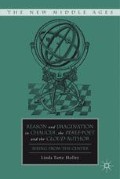Abstract
By remarkable wit, the longing for a place to stand to understand turns to game in Patience. One of the most moving and remarkable aspects of the poem is the playful—and painful—exchange between Jonah and his god God chooses Jonah for a job the young prophet does not want. Already, Jonah seems to be one of us—the child who did not want to clean up her room, do her homework, write a thank-you note, and the adult who rather likes to do the right thing in a timely manner but vaguely refuses to act. In fact, God and Jonah are quite honest with each other and speak in conversational tones tha remind us of St. Augustine’s dilemma in Book 10 of The Confessions:
And from thee, O Lord, unto whose eyes the
bottom of man’s conscience is laid bare, what could
be hidden in me though I would not confess it? for
so should I hide thee from me, not myself from thee. (X, ii)1
Access this chapter
Tax calculation will be finalised at checkout
Purchases are for personal use only
Preview
Unable to display preview. Download preview PDF.
Notes
St. Augustine, Confessions, with an English translation by William Watts, Vol. 2, 1631, London: Heinemann, 1912.
Patience in A Book of Middle English, 2nd edition, edited by J.A. Burrow and Thorlac Turville-Petre. Oxford: Blackwell Publishers, 1996, l. 425. References to Patience—text, notes, and glosses—will be to this edition unless otherwise noted.
Max Jammer, Concepts of Space: The History of Theories of Space in Physics. New York: Dover Publications, 1993, 31–32.
Invaluable information for the introductory remarks to this chapter come from Max Jammer; Edward Grant. Much Ado about Nothing. Cambridge: Cambridge University Press, 1981;
Grant, Planets, Stars, and Orbs: The Medieval Cosmo, 1200–1687. Cambridge: Cambridge University Press, 1994;
Edith Wilks Dolnikowski, Thomas Bradwardine: A View of Time and a Vision of Eternity in Fourteenth-Century Thought. New York: Brill, 1995;
God and Nature: Historical Essays on the Encounter between Christianity and Science, edited by David C. Lindberg and Ronald L. Numbers, Berkeley: University of California Press, 1986;
H. Lamar Crosby, Jr., Thomas of Bradwardine: His Tractatus de Proportionibus: Its Significance for the Development of Mathematical Physics, Madison: The University of Wisconsin Press, 1961.
Johan Huizinga, Homo Ludens: A Study of the Play Element in Culture Boston: The Beacon Press, 1955. See especially chapter V, “Play and War” and chapter VI, “Playing and Knowing.”
Anonymous, Patience in A Book of Middle English, J.A. Burrow and Thorlac Turville-Petre, eds., Oxford: Blackwell Publishers, 2001, 161.
The Poems of the Pearl Manuscript, edited by Malcolm Andrew and Ronald Waldron, York Medieval Texts (second series). Berkeley: University of California Press, 1978. I like Andrew and Waldron’s glosses on mere: “sea” in the present line (112) but “boundary” in l. 320. I would read “boundary” here in l. 112 so that the sense of con¬tainment works with the sea as it does with the mountain in l. 320. As Andrew and Waldron point out, however, the poet is closely following Jonas here. Jonas II, 7.
H. Lamar Crosby, Jr., Thomas Bradwardine: His Tractatus de Proportionibus: Its Significance for the Development of Mathematical Physics. Madison: The University of Wisconsin Press, 1961, 7.
Copyright information
© 2011 Linda Tarte Holley
About this chapter
Cite this chapter
Holley, L.T. (2011). Patience: The Space of Play. In: Reason and Imagination in Chaucer, the Perle-Poet, and the Cloud-Author. The New Middle Ages. Palgrave Macmillan, New York. https://doi.org/10.1057/9780230339248_6
Download citation
DOI: https://doi.org/10.1057/9780230339248_6
Publisher Name: Palgrave Macmillan, New York
Print ISBN: 978-1-349-28953-0
Online ISBN: 978-0-230-33924-8
eBook Packages: Palgrave Literature CollectionLiterature, Cultural and Media Studies (R0)

